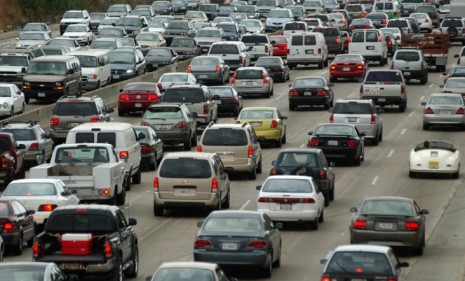Does pollution cause brain damage?
Time to move to the arctic? A new study in southern California finds that smoggy air can injure more than your heart and lungs

A free daily email with the biggest news stories of the day – and the best features from TheWeek.com
You are now subscribed
Your newsletter sign-up was successful
Clogged highways have already been linked to heart and lung problems, but in case you needed another reason to hate traffic, here it is: New research says car pollution on southern California's freeways might be causing brain damage in commuters and people who live near the roads. Here's a concise guide:
What exactly did the researchers discover?
Using air samples from the congested Interstate 110 freeway near the University of Southern California campus, they recreated the polluted freeway atmosphere in a laboratory, and exposed mice to the air for a total of 150 hours over 10 weeks. The contaminated air kept neurons from developing, resulting in brain damage. The researchers theorized that the air would have the same effect on humans.
The Week
Escape your echo chamber. Get the facts behind the news, plus analysis from multiple perspectives.

Sign up for The Week's Free Newsletters
From our morning news briefing to a weekly Good News Newsletter, get the best of The Week delivered directly to your inbox.
From our morning news briefing to a weekly Good News Newsletter, get the best of The Week delivered directly to your inbox.
How severe was the damage?
The brains of the mice — and in vitro brain cells — showed signs of inflammation associated with Alzheimer's disease, and damage to cells that could cause memory loss and learning difficulties. "Our data would suggest that freeway pollution could have a profound effect on the development of neurons and brain health in children and young kids," says researcher Todd Morgan, as quoted in the Los Angeles Times, "especially those who attend schools built alongside freeways."
Is this all the result of exhaust from automobiles?
The primary source of pollution is indeed the burning of fossil fuels in car engines, but several other sources contribute to the mix. People who live near freeways or drive on them also inhale tiny particles that fly off weathering car parts, or the pavement itself.
A free daily email with the biggest news stories of the day – and the best features from TheWeek.com
Should commuters really be worried?
Yes, say the researchers. Frequent commuters might be exposed to bad freeway air for more hours per week than the study's mice. And these toxic particles are so small — about one-thousandth the width of a human hair — that there is no way to trap them in air filters. Commuters might try working more from home, or using mass transit. For people living along highways, there's no ready solution. "How can we protect urban dwellers from this type of toxicity?" says USC neurobiologist Caleb Finch, the lead author in the study. "That's a huge unknown."
Sources: Reuters, CBS Los Angeles, TIME, LA Times, LA Streets Blog
-
 6 exquisite homes with vast acreage
6 exquisite homes with vast acreageFeature Featuring an off-the-grid contemporary home in New Mexico and lakefront farmhouse in Massachusetts
-
 Film reviews: ‘Wuthering Heights,’ ‘Good Luck, Have Fun, Don’t Die,’ and ‘Sirat’
Film reviews: ‘Wuthering Heights,’ ‘Good Luck, Have Fun, Don’t Die,’ and ‘Sirat’Feature An inconvenient love torments a would-be couple, a gonzo time traveler seeks to save humanity from AI, and a father’s desperate search goes deeply sideways
-
 Political cartoons for February 16
Political cartoons for February 16Cartoons Monday’s political cartoons include President's Day, a valentine from the Epstein files, and more